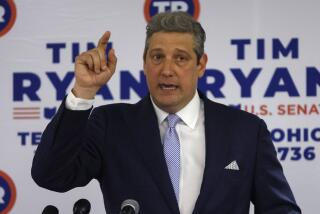Gore Forced to Fight the Clinton Factor
- Share via
NEW ORLEANS — On a day when he wanted to keep political attention focused on Social Security, Vice President Al Gore found himself Friday defending the distance that has emerged between his campaign and the White House.
Waking up to a number of newspaper stories calling attention to internal debates over the role President Clinton will play in the closing days of the campaign, Gore, in shirt sleeves and mug of coffee in hand, approached reporters aboard Air Force Two on Friday morning with the goal of maintaining his drumbeat of attacks on Republican rival Gov. George W. Bush.
“I’m ready to talk about Social Security,” he said.
But for the second time Friday--he had already been asked about Clinton’s campaign work on a morning news show--the discussion turned to just the sort of debate a candidate wants to avoid: one that strays far from his agenda.
“Look,” Gore said to the inevitable question of Clinton’s role, “this is a campaign I’m running on my own. I am who I am.”
For at least a year, that has been the vice president’s approach when seeking to shed the potential political baggage of his eight-year association with Clinton.
“I’m running on my own, with my own vision about the future of our country,” Gore said.
Besides, he said, with Congress still in session and “the particular challenges of foreign policy” weighing on the White House, Clinton has work to do in Washington.
In reality, however, the president has a hectic campaign schedule planned. He is spending few full days in Washington. He will spend several days in New York state to boost his wife’s Senate candidacy, and his aides already have announced that he will go on the road to rev up Democrats in several key states before election day.
Gore’s matter-of-fact answers belie the importance of the question laid at his campaign’s feet by the news reports: Does Clinton help Gore more by campaigning for him or by remaining on the sidelines?
It is a common political debate when a senior political figure generates extraordinary controversy, as Clinton has. The Gore campaign, said one Democratic advisor with campaign experience dating to Lyndon B. Johnson’s presidency, recognizes that Clinton could energize traditional Democratic voters. But independent or swing voters, around whom the election hinges, disapprove of Clinton by about a 2-1 ratio.
“It’s a very tough call, but for the Gore campaign it’s the right call,” the Democratic veteran said. “ . . . Among those voters, he’s a net minus.”
For his part, Gore insists that the president already has been campaigning for him.
But the president’s appearances have been largely at Democratic Party fund-raising events rather than at the large rallies that traditionally end a campaign. Clinton excels in just such large-crowd settings, and they generate far more attention than speeches to well-heeled party contributors.
And the non-New York campaign events that are on his schedule do not, so far, call for the crowd-pleasing, fired-up public speeches that would underline Gore’s political needs--but also would remind voters of the vice president’s close link to the president.
Before Friday, when they appeared together at the funeral of Missouri Gov. Mel Carnahan, who died Monday in a plane crash, Clinton and Gore last appeared together in August during a ceremonial torch-passing before the Democratic National Convention.
At the funeral, out of the media’s view, the president and vice president embraced, according to a White House aide. With their wives, Hillary and Tipper, the men rode together in one limousine--for security reasons they rarely travel together--to the funeral on the lawn of the Missouri State Capitol.
Later, the president and his wife made a point of escorting the Gores to the steps of Air Force Two at the Columbia, Mo., airport.
The vice president’s preferred subject Friday continued his theme of several days: that Bush’s plan to allow the private investment of some Social Security funds would doom the system.
Gore and his advisors maintain that if $1 trillion, the figure Bush uses, is diverted from the Social Security trust fund to the stock and bond markets, the retirement plan would quickly face a shortfall, forcing a cut in benefits or heavy borrowing. This is because payments to the trust fund by future retirees are turned around almost immediately to pay current beneficiaries.
Gore argued that Bush must choose: Meet commitments to keep sending out Social Security checks at current levels, or overhaul the system with the idea of making private, long-term investments for future retirees.
“As the days tick down to the election,” Gore said, “it really is time for Gov. Bush to explain which promise he intends to keep and which promise he intends to break, because it is abundantly obvious that you cannot spend the same trillion dollars twice.”
Gore’s running mate, meanwhile, campaigned Friday in tightly contested Pennsylvania and vowed that he and Gore would continue the country’s prosperity.
“The central question before the voters this year is ‘Do we want to keep the country moving forward?’ ” said Connecticut Sen. Joseph I. Lieberman, speaking to about 75 employees at FreeMarkets, an online auction company.
*
Times political writer Cathleen Decker contributed to this story.
More to Read
Get the L.A. Times Politics newsletter
Deeply reported insights into legislation, politics and policy from Sacramento, Washington and beyond. In your inbox twice per week.
You may occasionally receive promotional content from the Los Angeles Times.










